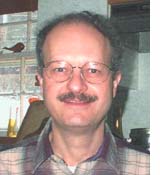 |

Friday Evening Lecture Series
 08/08/03 08/08/03
Regulation of Aging by SIR2
Lenny Guarente, Novartis Professor of Biology, Massachusetts Institute of Technology
Introduction by Douglas C. Wallace, Donald Bren Professor of Molecular Medicine, University of California, Irvine
Lecture Abstract:
Since the dawn of consciousness, humans have been aware of their own mortality. The quest for immortality can be traced from the earliest ancient writings to the efforts of philosophers, shamans, and alchemists in recent centuries. Now, for the first time, modern medicine provides an opportunity to examine human aging scientifically. We have known for 50 years that in times of scarcity, for example when caloric intake from the diet is low, the aging process and the ability to reproduce are slowed down. Over the past decade, we have learned much about the molecular basis of how aging is so regulated. A gene called SIR2, which is present in all organisms from yeast to humans, appears to trigger the slowing of aging in times of scarcity. This lecture will describe how this gene was identified and what it does to the aging process. Based on this information, a biotechnology company, Elixir Pharmaceuticals, was founded to develop drugs to target SIR2 and thereby slow aging and mitigate diseases of aging. The progress of Elixir and its potential impact on society will also be discussed.
Leonard Guarente received a B.A. in Biology from Massachusetts Institute of Technology in 1974 and his Ph.D. in Molecular Genetics from Harvard University in 1978. After completing a Jane Coffin Childs Postdoctoral Fellowship at Harvard University in 1981, he went on to join the faculty of Massachusetts Institute of Technology as an Assistant Professor of Biology. He progressed to an Associate Professor in 1985, and since 1991, has been a Professor of Biology. From July 1984 until June 1989, Dr. Guarente was a Presidential Young Investigator of the National Academy of Science. He was elected to the American Academy of Microbiology in 1998, and in 1999 became an Ellison Medical Foundation Senior Scholar. In 2000 he was a Novartis Professor of Biology and in 2001 was an Academy of the American Society for Healthy Aging Investigator. In addition, Dr. Guarente is on the editorial boards of many prominent scientific publications, including Science magazine, Journal of Anti-Aging Medicine, and Genes and Development. He is the founder of Elixir Pharmaceuticals and in 2003 published his book, AgelessQuest.Dr. Guarente has been an Instructor in the MBL's Aging Course since 1999.
Douglas C. Wallace, Ph.D. received his B.S. degree from Cornell University in 1968, majoring in genetics, developmental biology, and microbiology, and graduated Yale University Medical School with a M.Ph. in 1972 and Ph.D in 1975. During his graduate studies, Dr. Wallace founded the field of human mitochondrial genetics. He was appointed Assistant Professor in the Department of Genetics at Stanford University Medical School in 1976. His application of techniques of molecular genetics to his studies permitted him to demonstrate the maternal inheritance of mitochondrial DNA, initiate the search for mtDNA disease mutations, and begin characterizing population-specific mtDNA sequence polymorphisms. Later he served at Emory University Medical School where he created the Center for Molecular Medicine. The Center permitted the integration of his clinical, diagnostic, and basic research programs on mitochondrial genetics and related neuromuscular diseases. In 2002, he moved to the University of California, Irvine where he is the Director of the Center for Molecular and Mitochondrial Medicine and Genetics. Dr. Wallace was a student in the MBL's Physiology Course in 1971 and is currently a course director, with Dr. Guarente, of the MBL's Molecular Biology of Aging course.
|